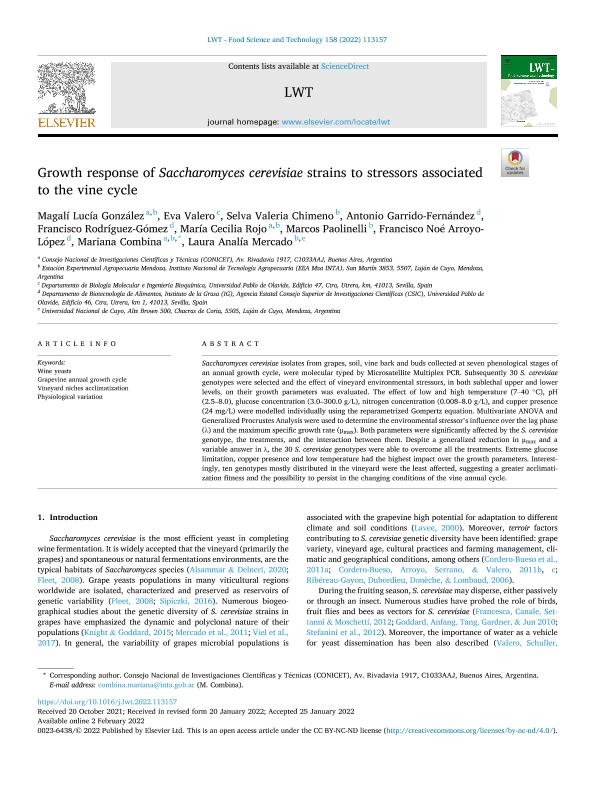Artículo
Growth response of Saccharomyces cerevisiae strains to stressors associated to the vine cycle
González, Magalí Lucía Rosa ; Valero, Eva; Chimeno, Selva Valeria; Garrido Fernández, Antonio; Rodríguez Gómez, Francisco; Rojo, María Cecilia
; Valero, Eva; Chimeno, Selva Valeria; Garrido Fernández, Antonio; Rodríguez Gómez, Francisco; Rojo, María Cecilia ; Paolinelli, Marcos
; Paolinelli, Marcos ; Arroyo López, Francisco Noé; Combina, Mariana
; Arroyo López, Francisco Noé; Combina, Mariana ; Mercado, Laura Analia
; Mercado, Laura Analia
 ; Valero, Eva; Chimeno, Selva Valeria; Garrido Fernández, Antonio; Rodríguez Gómez, Francisco; Rojo, María Cecilia
; Valero, Eva; Chimeno, Selva Valeria; Garrido Fernández, Antonio; Rodríguez Gómez, Francisco; Rojo, María Cecilia ; Paolinelli, Marcos
; Paolinelli, Marcos ; Arroyo López, Francisco Noé; Combina, Mariana
; Arroyo López, Francisco Noé; Combina, Mariana ; Mercado, Laura Analia
; Mercado, Laura Analia
Fecha de publicación:
03/2022
Editorial:
Elsevier Science
Revista:
LWT - Food Science and Technology
ISSN:
0023-6438
Idioma:
Inglés
Tipo de recurso:
Artículo publicado
Clasificación temática:
Resumen
Saccharomyces cerevisiae isolates from grapes, soil, vine bark and buds collected at seven phenological stages of an annual growth cycle, were molecular typed by Microsatellite Multiplex PCR. Subsequently 30 S. cerevisiae genotypes were selected and the effect of vineyard environmental stressors, in both sublethal upper and lower levels, on their growth parameters was evaluated. The effect of low and high temperature (7–40 °C), pH (2.5–8.0), glucose concentration (3.0–300.0 g/L), nitrogen concentration (0.008–8.0 g/L), and copper presence (24 mg/L) were modelled individually using the reparametrized Gompertz equation. Multivariate ANOVA and Generalized Procrustes Analysis were used to determine the environmental stressor's influence over the lag phase (λ) and the maximum specific growth rate (μmax). Both parameters were significantly affected by the S. cerevisiae genotype, the treatments, and the interaction between them. Despite a generalized reduction in μmax and a variable answer in λ, the 30 S. cerevisiae genotypes were able to overcome all the treatments. Extreme glucose limitation, copper presence and low temperature had the highest impact over the growth parameters. Interestingly, ten genotypes mostly distributed in the vineyard were the least affected, suggesting a greater acclimatization fitness and the possibility to persist in the changing conditions of the vine annual cycle.
Archivos asociados
Licencia
Identificadores
Colecciones
Articulos(CCT - MENDOZA)
Articulos de CTRO.CIENTIFICO TECNOL.CONICET - MENDOZA
Articulos de CTRO.CIENTIFICO TECNOL.CONICET - MENDOZA
Citación
González, Magalí Lucía Rosa; Valero, Eva; Chimeno, Selva Valeria; Garrido Fernández, Antonio; Rodríguez Gómez, Francisco; et al.; Growth response of Saccharomyces cerevisiae strains to stressors associated to the vine cycle; Elsevier Science; LWT - Food Science and Technology; 158; 3-2022; 1-11
Compartir
Altmétricas



